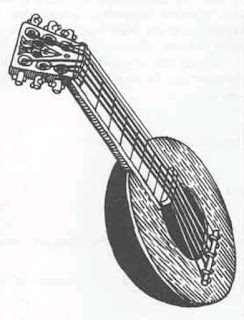The enduringly popular 1981 edition of D&D, often called B/X or Moldvay D&D, was my introduction to tabletop RPGs. That should come as no surprise, given the name I chose for this very blog back in the day. It's also the version I've played and enjoyed most recently, running a B1 In Search of the Unknown one-shot at the 42nd Dragonflight gaming convention last month. Its approachability, polish, and overall brilliance have stood the test of time. I truly adore it.
It's not home, though. Not really. Shortly after 12 year-old me discovered that little red book in a secondhand store circa 1990, I fell in with a local group of established (and tolerant) adult gamers, and they swore by none other than Gary Gygax's own Advanced Dungeons & Dragons. Here, I'm talking the original (dare I say "real?") version, not the then-current AD&D 2nd Edition.
If B/X fired my young imagination, getting my hands on the AD&D books fanned it into a dizzying phantasmagoric inferno. These weighty tomes with their baroque prose and ominous illustrations felt like a world unto themselves; brooding, mysterious, and, in hindsight, metal as hell. Ironic, since I suspect Gygax's own musical tastes were anything but. To a middle schooler, these texts were dense and challenging, almost to the point of hostility, yet the darkly glamorous vistas of fantasy they promised shimmered mirage-like at edges of my understanding, making them paradoxically impossible to put down. It was a profoundly meaningful, once-in-a-lifetime reaction to an RPG system. To put it simply, these are magic books in my eyes.
It wasn't long after this that I became an avid reader of Dragon magazine, which was primarily an AD&D-focused publication at that time. That meant 2nd Edition, of course, but the concepts and terminology employed in most articles was relatable enough. In the pre-Internet era, Dragon was my primary connection to the hobby at large, and this further cemented various AD&D-isms like percentile strength and the nine-point alignment system as the default in my mind.
So what I'm really getting at here, I suppose, is that I've come to accept that I am, at heart, an AD&Der. Then, now, and forever. It's my conceptual norm, my platinum standard, my Real Deal Holyfield of fantasy RPGs. I've played, and harbor no small amount of affection for, all the game's TSR-era iterations. Even 2E is entitled to some love from me. I've also had great luck with the various latter day retro-clone versions of the same, such as Labyrinth Lord, Swords & Wizardry, and, of course, OSRIC. Authentic late '70s/early '80s AD&D still sits at the apex of the pyramid for me, however. Is it flawless? Lord, no! I'm just at a point where those perceived imperfections (the absurd pummeling/grappling rules, for example) don't really grate on me the way they used to. If I don't like a sub-system, I don't need to use it. Any DM remotely worthy of the title knows that. Mine is a hard-earned "warts and all" love, not a naive denial of reality. On the flipside, playing these various simplified or pared-down versions of the game, I always find myself hankering for some AD&D rule or other. Better to have it and not want it than want it and not have it.
AD&D isn't perfect and it isn't for everyone. What it is is the only game that's ever filled me with the wide-eyed awe and shuddering dread of flipping through the demon section of the Monster Manual, picturing the horrors that awaited intruders in the noisome lair of the Demon Price Juiblex. That's irreplacable and that's why it's home.
















,_f.45v_-_BL_Yates_Thompson_MS_26.jpg)






























.JPG)









